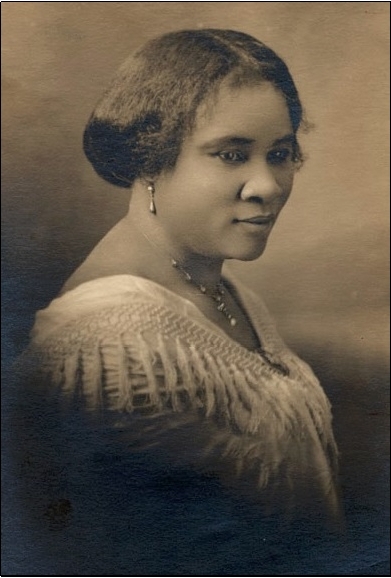Born in 1867, Madam Caroline J. Walker was a businesswoman and the first African American lady millionaire in the US. She is regarded as one of the most inspiring Black women in history. Although her parents were enslaved on a cotton plantation in North Carolina before the American Civil War, and she did not come from a family influence, it did not stop her from building one of the greatest business legacies in history. Read on to learn more about the inspiring life of Madam Caroline J. Walker.
Early Life
Madam C.J. Walker was orphaned when she was seven years old and lived with her sibling. She married Moses McWilliams when she was 14 years old, she claims, to avoid the abuse of a “cruel” brother-in-law.
She relocated to St. Louis, Missouri, with her -year-old daughter after becoming a widow at the age of twenty. She worked as a laundress while also attending night school. She sang in the St. Paul African Methodist Episcopal Church choir and became involved in the National Association of Colored Women. This is where she met Charles J. Walker –the man who would become her second husband in 1906 and inspire the name of her eventual empire. Business Career
She worked as a sales agent for almost two years. In 1905, after relocating to Denver, she began working as a cook for a pharmacist, from whom she learned the fundamentals of chemistry. She applied to develop a remedy for dandruff and hygiene-related ailments that were common at a time when most Americans did not have access to indoor plumbing.
Walker was inspired to create hair care products for Black women after suffering from a scalp disease that led her to lose a significant amount of hair. She devised a solution that fundamentally transformed the Black haircare market. While there were other products for Black hair on the market, she distinguished hers by highlighting its focus on the health of the women who would use it. Her personalized pomade was a smashing success!
She achieved local success with what would eventually be known as the “Walker Method” or the “Walker System of Beauty Culture.” From that point on, she was referred to as Madam C.J. Walker. She relocated to Pittsburgh with her husband in 1908, after spending the previous two years educating Walker agents and “beauty culturists” throughout the southern and eastern United States.
C.J. Walker established the Lelia College of Beauty Culture, named after her daughter in Pittsburgh. She was attracted to the thriving Black business scene in Indianapolis, and in 1910 she relocated the headquarters of the Madam C.J. Walker Manufacturing Company to that location.
An Activist & Philanthropist
In the years that followed, she expanded her business by traveling across the country and establishing professional paths and financial independence for thousands of African American women who would otherwise have been confined to menial employment such as maid, cook, laundress, and farmhand.
When she traveled to the Caribbean and Central America in 1913, she marked the beginning of her worldwide career. Her contributions to the Young Men’s Christian Association building fund in Indianapolis in 1911, as well as her $5,000 contribution to NAACP anti-lynching fund in 1919, established Walker as a philanthropist in addition to her political activism.
Her charitable contributions included financial support for Black students, orphanages, and retirement homes, among other causes. As a result of her political activism, she spoke out against lynching during the Negro Silent Protest Parade in 1917 and during a visit to the White House in 1918, as well as for the rights of African American soldiers serving in France during World War I.
The Legacy of Madam C.J. Walker
The Villa Lewaro estate in Irvington, which she built in the 1920s, is now a National Historic Landmark and a National Trust for Historic Preservation national treasure. Walker also purchased the property in downtown Indianapolis before her death in 1919, which was later transformed into the Madam Walker Theatre Center, which is now a National Historic Landmark. Walker died in 1919.
In addition to her properties, Madam C.J. Walker left a legacy of success. Despite the unfavorable circumstances she met, she challenged the views about women, specifically Black women, and business acumen. Even today, she is one of the best examples of resilience – black, bold, beautiful, and successful. She died on May 25, 1919, after a long illness. Buy the book African American Inventor Package by Philip Franklin to learn about the unsung black inventors in history.

